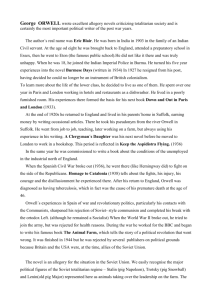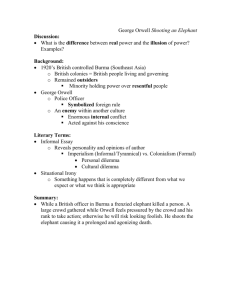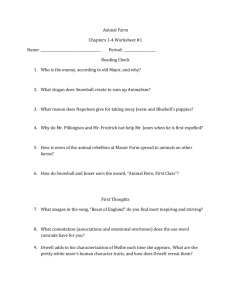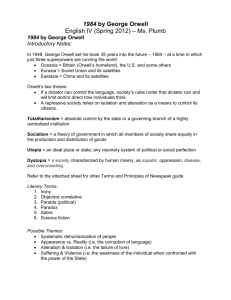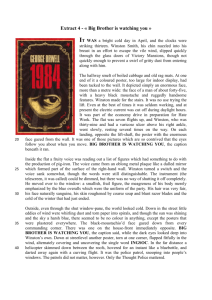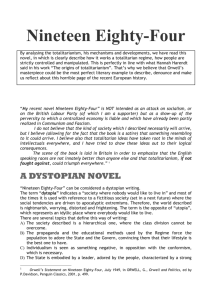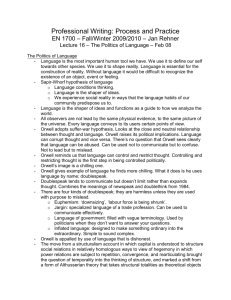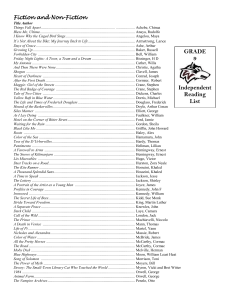George Orwell and the theme
advertisement
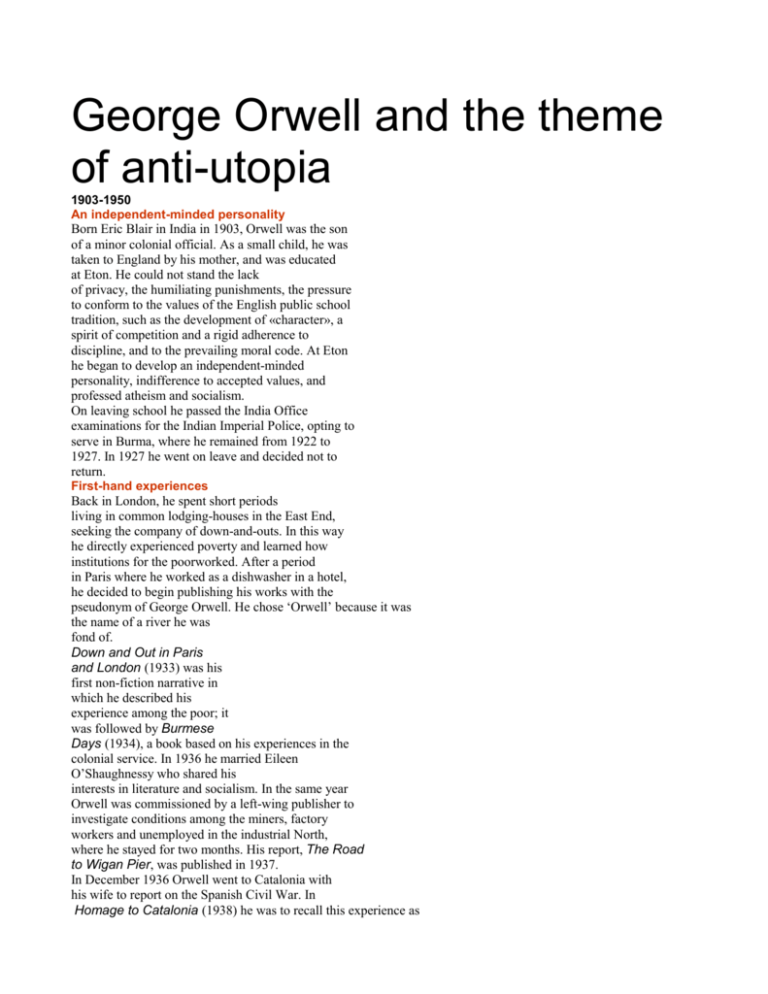
George Orwell and the theme of anti-utopia 1903-1950 An independent-minded personality Born Eric Blair in India in 1903, Orwell was the son of a minor colonial official. As a small child, he was taken to England by his mother, and was educated at Eton. He could not stand the lack of privacy, the humiliating punishments, the pressure to conform to the values of the English public school tradition, such as the development of «character», a spirit of competition and a rigid adherence to discipline, and to the prevailing moral code. At Eton he began to develop an independent-minded personality, indifference to accepted values, and professed atheism and socialism. On leaving school he passed the India Office examinations for the Indian Imperial Police, opting to serve in Burma, where he remained from 1922 to 1927. In 1927 he went on leave and decided not to return. First-hand experiences Back in London, he spent short periods living in common lodging-houses in the East End, seeking the company of down-and-outs. In this way he directly experienced poverty and learned how institutions for the poorworked. After a period in Paris where he worked as a dishwasher in a hotel, he decided to begin publishing his works with the pseudonym of George Orwell. He chose ‘Orwell’ because it was the name of a river he was fond of. Down and Out in Paris and London (1933) was his first non-fiction narrative in which he described his experience among the poor; it was followed by Burmese Days (1934), a book based on his experiences in the colonial service. In 1936 he married Eileen O’Shaughnessy who shared his interests in literature and socialism. In the same year Orwell was commissioned by a left-wing publisher to investigate conditions among the miners, factory workers and unemployed in the industrial North, where he stayed for two months. His report, The Road to Wigan Pier, was published in 1937. In December 1936 Orwell went to Catalonia with his wife to report on the Spanish Civil War. In Homage to Catalonia (1938) he was to recall this experience as the time of his true conversion to socialism and the ideals of brotherhood and equality. Back to England the Orwells adopted an infant child . They both had a poor health. An influential voice of the 20th century When the Second World War broke out, Orwell moved to London and, in 1941, he joined the BBC, broadcasting cultural and political programmes to India. In 1943 he resigned and became literary editor of ‘Tribune’, an influential socialist weekly. He also began writing Animal Farm, which was published in 1945, just when the Iron Curtain was beginning to fall on Eastern Europe, and it made Orwell internationally known and financially secure. Orwell’s last book, Nineteen EightyFour was his most original novel; it was published in 1949 and soon became a best-seller. Orwell died of tuberculosis the following year. The artist’s development Orwell had a deep understanding of the English character, of its tolerance, its dislike of abstract theories and insistence on common sense and fair play. On the other hand, his various experiences abroad contributed to his unusual ability to see his country from the outside and to judge its strengths and weaknesses. he was receptive to new ideas and impressions. Orwell’s life and work were marked by the unresolved conflict between his middle-class background and education and his emotional identification with the working class. In his essay Inside the Whale (1940), Orwell tried to define the role of the writer considering the literature of the 1920s and 1930s. Whereas the writers of the Twenties had concerned themselves with language and form to express a tragic, post-war pessimism, those of the Thirties had valued social purpose and content over form, and had left-wing sympathies. His desire to inform, to reveal facts and draw conclusions from them, led him to believe that writing interpreted reality and therefore served a useful social function. This explains why his most successful novels express political themes. However, Orwell believed that the writer should be independent. Social themes Orwell was a prolific book-reviewer, critic, political journalist and pamphleteer in the tradition of Swift and Defoe. Indebted to Dickens in the choice of social themes and the use of realistic and factual language, he conveyed a vision of human fraternity and of the misery caused by poverty and deprivation. He insisted on tolerance, justice and decency in human relationships, and warned against the increasing artificiality of urban civilisation. Above all he presented a devastating critique of totalitarianism, warning against the violation of liberty and helping his readers to recognise tyranny in all its forms. Nineteen-eighty-four Structure and plot The novel describes a future England, no longer the head of an Empire, but an outpost of Oceania, a vast totalitarian system including North America, South Africa, and Australia. The country is ruled by the Party, which is led by a figure called Big Brother. The work is divided into three parts: Part One introduces the main character, Winston Smith, in the context of a regimented, oppressive world; Part Two describes his love for Julia, and the temporary happiness their relationship brings to both; Part Three deals with Winston’s imprisonment and torture by the Thought Police, and the final loss of his intellectual integrity. AUTHORS AND TEXTS An anti-utopian novel Orwell combined various genres and styles in an original way, blending documentary realism and an acute eye for detail with parody and satire. The tone of the book becomes increasingly pessimistic, violent and even sadistic in the last part, where Orwell presents Winston’s final defeat. Set in a grotesque, squalid and menacing London, Nineteen Eighty-Four is an anti-utopian novel. While a utopia is an ideal or perfect community some writers have described to embody their ideals, anti-utopias show possible future societies that are anything but ideal and that ridicule existing conditions of society. Orwell presents a frightening picture of the future as being under the constant control of “Big Brother.” There is no privacy because there are monitors called telescreens watching every step people take; love is forbidden but there is the Two Minutes Hate and the country is in a perpetual state of war. The Party has absolute control of the press, communication and propaganda; language, history and thought are controlled in the interests of the state through the gradual introduction of Newspeak, the official language whose lexis is so limited that people find it impossible to express their own ideas. Any form of rebellion against the rules is punished with prison, torture and liquidation. The novel does not offer consolation but reveals the author’s acute sense of history and his sympathy with the millions of people persecuted and murdered in the name of the totalitarian ideologies of the 20th century. Winston Smith Nineteen Eighty-Four conveys a sense of loss, a feeling that beauty and truth, and all the finer emotions and values, belong to the past. This is symbolised by the protagonist, Winston Smith, the last man to believe in humane values in a totalitarian age. Smith suggests his symbolic value; Winston evokes Churchill’s patriotic appeals for “blood, sweat and tears” during the Second World War. Winston is middle-aged and physically weak; he experiences alienation from society and feels a desire for spiritual and moral integrity. He works at the Ministry of Truth where he alters the records of the past to fit current Party policy. In private he writes on the creamy paper of an old diary in an attempt to maintain sanity in a disorienting world. In the first two parts of the novel it is likely that Winston and the narrator are one, and that he expresses Orwell’s views. Big Brother is watching you Nineteen Eighty-Four (1949) Part I, Chapter 1 1. Do you think the question of privacy is a pressing one in contemporary society? Can you provide any examples? This extract gives an insight into life in London, the capital of Oceania, a totalitarian state where men have lost control of their inner being. The only person who tries to resist indoctrination is the protagonist of the book, Winston Smith. SPEAKING G. Orwell Outside, even through the shut window-pane, the world looked cold. Down in the street little eddies7 of wind were whirling dust and torn paper into spirals, and though the sun was shining and the sky a harsh blue, there seemed to be no colour in anything, except the posters that were plastered everywhere. The black-moustached face gazed down from every commanding corner. There was one on the house-front immediately opposite. BIG BROTHER IS WATCHING YOU, the caption said, while the dark eyes looked deep into Winston’s own. Down at street level another poster, torn at one corner, flapped fitfully8 in the wind, alternately covering and uncovering the single word ingsoc. In the far distance a helicopter skimmed down9 between the roofs, hovered for an instant like a bluebottle10, and darted away again with a curving flight. It was the police patrol, snooping11 into people’s windows. The patrols did not matter, however. Only the Thought Police mattered. Behind Winston’s back the voice from the telescreen was still babbling away about pig-iron and the over-fulfilment of the Ninth Three-Year Plan. The telescreen received and transmitted simultaneously. Any sound that Winston made, above the level of a very low whisper, would be picked up by it; moreover, so long as he remained within the field of vision which the metal plaque commanded, he could be seen as well as heard. There was of course no way of knowing whether you were being watched at any given moment. How often, or on what system, the Thought Police plugged in12 on any individual wire was guesswork13. It was even conceivable that they watched everybody all the time. But at any rate they could plug in your wire whenever they wanted to. You had to live – did live, from habit that became instinct – in the assumption that every sound you made was overheard, and, except in darkness, every movement scrutinized. Winston kept his back turned to the telescreen. It was safer; though, as he well knew, even a back can be revealing. A kilometre away the Ministry of Truth, his place of work, towered vast and white above the grimy landscape. This, he thought with a sort of vague distaste – this was London, chief city of Airstrip One, itself the third most populous of the provinces of Oceania. He tried to squeeze out some childhood memory that should tell him whether London had always been quite like this. Were there always these vistas of rotting14 nineteenth-century houses, their sides shored up with baulks of timber15, their windows patched with cardboard and their roofs with corrugated iron, their crazy garden walls sagging16 in all directions? And the bombed sites where the plaster dust swirled in the air and the willow-herb straggled over the heaps of rubble17; and the places where the bombs had cleared a larger patch and there had sprung up sordid colonies of wooden dwellings18 like chicken-houses? But it was no use, he could not remember: nothing remained of his childhood except a series of bright-lit tableaux19, occurring against no background and mostly unintelligible. The Ministry of Truth - Minitrue, in Newspeak – was startlingly different from any other object in sight. It was an enormous pyramidal structure of glittering white concrete21, soaring up22, terrace after terrace, 300 metres into the air. From where Winston stood it was just possible to read, picked out on its white face in elegant lettering, the three slogans of the Party: WAR IS PEACE FREEDOM IS SLAVERY IGNORANCE IS STRENGTH AUTHORS AND TEXTS 2. Gather information about the social and political organisation of Oceania as regards security and control, people’s private lives, language, politics. 3. Note down the details the passage gives you about the protagonist. Consider his name, physical appearance, clothes, mood, job. 4. Discuss the symbolic meaning of the elements concerning Winston Smith’s description. 1. His name Winston: who may have inspired Orwell in the choice of such a name? 2. His surname Smith: how would you explain the choice of such a common British surname? 3. His age and appearance: do they correspond to the traditional features of the «hero»? 4. His memories: can he remember anything about his past? 5. Analyse the presence of Big Brother in the extract. 1. Through what device is it conveyed? What does this method remind you of? 2. Big Brother is also the parody of a historical figure. Single out the details of his description and try to guess who he is. 6. Orwell created a disturbing vision of the city of the future. What features of the life in such a city particularly strike you? 7. Analyse the three slogans of the Party. 1. What kind of words does Orwell employ? 2. How does this affect the meaning of each slogan? 8. What does Orwell attack and at the same time warn against in the passage? SPEAKING READING and SPEAKING
